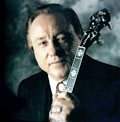Our UK correspondent, Richard F Thompson, couples the news of this long-overdue recognition with a brief recap of Earl Scruggs’ distinguished career in bluegrass.
 Bluegrass legend Earl Scruggs, who celebrated his 84th birthday on Sunday, will receive a 2008 Grammy Award for lifetime achievement from The Recording Academy. The award honors “lifelong artistic contributions to the recording medium.”
Bluegrass legend Earl Scruggs, who celebrated his 84th birthday on Sunday, will receive a 2008 Grammy Award for lifetime achievement from The Recording Academy. The award honors “lifelong artistic contributions to the recording medium.”
Earl Scruggs’ recording career spans almost all of his adult life, beginning in September 1946 when he first recorded as a member of Bill Monroe’s Blue Grass Boys. He participated in four sessions, recording 28 songs and thus helping to provide the template for all that is great about bluegrass music.
In 1948 Scruggs left the Blue Grass Boys and shortly thereafter he helped to form The Foggy Mountain Boys with guitarist Lester Flatt. The duo fronted that band for over 20 years and went on to earn acclaim as one of the exalted trinity of pioneering bluegrass acts. They recorded many classic bluegrass songs and tunes, Cabin In Caroline; Take Me In Your Lifeboat; Don’t This Road Look Rough And Rocky; No Mother Or Dad; Blue Ridge Cabin Home; Some Old Day; You Can Feel It In Your Soul; Dim Lights, Thick Smoke; Crying My Heart Out Over You; Take Me In Your Lifeboat; Heaven; Give Me Flowers While I’m Living; Cabin On The Hill; Don’t Get Above Your Raisin’; Foggy Mountain Breakdown; Randy Lynn Rag; Fire Ball Mail; Bugle Call Rag; Reuben; and Shuckin’ The Corn is just a sample of their vast catalog.
In 1969 after Flatt and Scruggs broke up, Scruggs started a new band, the Earl Scruggs Revue, featuring his sons, Randy, Gary and Steve, and Josh Graves. They stayed together for about a decade and during that time they recorded and released several albums.
In August 1971 Scruggs participated in the historical sessions that produced the much-acclaimed Will the Circle Be Unbroken 3-LP set. While it is officially a Nitty Gritty Dirt Band release it brought together the quintet, Scruggs and a host of ‘traditional’ musicians. Scruggs also contributed to the two subsequent releases with the same title, released in 1989 and 2002, respectively.
Scruggs has continued to record. One of the most acclaimed CDs is The Three Pickers, a collaboration with Doc Watson and Ricky Skaggs – released in 2003 and also available as a DVD.
The latest addition to the Scruggs catalog is another CD, released last May, on which he also shares the spotlight, this time with Little Roy Lewis and “Lizzie” Long for a release entitled Lifetimes.
Scruggs has won other Grammy Awards, the first being presented to him for the famous Flatt and Scruggs instrumental Foggy Mountain Breakdown. In 2002 Scruggs won a second Grammy award, this time for the 2001 recording of Foggy Mountain Breakdown, which can be found on the CD Earl Scruggs and Friends (MCA Nashville, 2001).
Earl Scruggs, together with Lester Flatt, was inducted into the Country Music Hall of Fame in 1985 and he was an inaugural inductee into the International Bluegrass Music Hall of Honor in 1991
Banjo player, one-time Director of the International Bluegrass Music Museum in Owensboro, KY, and author Tom Adler shares his thoughts about the impact Earl Scruggs’ recordings have had in his life ..
I had already ‘discovered’ the banjo, and found it to be an interesting instrument before I ever heard Earl Scruggs, but hearing his playing on a record back in south Chicago when I was 12 years old instantly oriented me toward a lasting goal: trying to produce that amazing, exciting sound myself. I still vividly recall the moment and circumstances in which a childhood friend said “hey, listen to this,” and put the needle down on the just-issued Flatt & Scruggs LP “Foggy Mountain Jamboree.”
I have summarized the experience ever since in bluegrass terms by noting that it “shucked my corn for good” <g> — meaning that it was a life-transforming event. In the time since then — nearly a half century! — I’ve learned that Earl’s recorded sound had a similar impact on thousands of others in the USA and around the world. I think the transforming power of his playing came to most of us principally from his recordings; not from any one particular tune or song, but from the incredible power of Earl’s playing in a small-group context, from the perfect timing and tone and appropriateness of each note and phrase he plays. No matter which particular banjo he plays, Earl bundles more energy and affective electricity into each note than anyone else. To say it in another way: Earl makes everything he plays “noteworthy.”
These many years later, he’s still my foremost artistic hero.
The lifetime achievement award will be presented February 9, 2008, one day before the Grammy Awards show at the Staples Centre in Los Angeles, which will air live on CBS.
Also on the list of honorees are Burt Bacharach, Doris Day, Cab Calloway, Itzhak Perlman, Max Roach and The Band. Recipients of the lifetime achievement award are determined by a vote of The Recording Academy’s National Board of Trustees.







